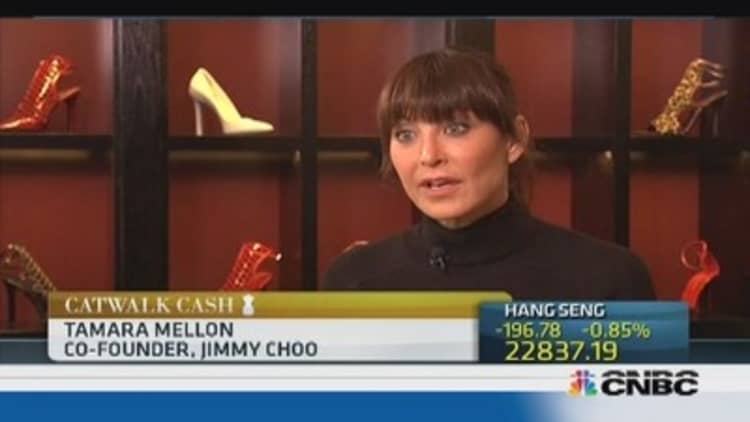
Tamara Mellon, the co-founder of the luxury brand Jimmy Choo, told CNBC that her former business partner Choo did not have the "creative vision" to design shoes, meaning that she and Choo's niece took up the sketch pad.
"Jimmy has a technical ability, he's very good at making shoes, but he didn't have the creative vision to design a collection. So that's where I ended up stepping in and becoming a designer by default," Mellon, the former chief creative officer and co-founder of Jimmy Choo, told CNBC on Wednesday.
Referring to Choo's niece Sandra Choi, Mellon said: "Sandra and I would sit together and she would sketch my ideas out. So I'd say, 'OK, I think it's going to be all African beading this season,' and then she'd sketch it out. So it was never meant to be a secret."
The claims come as Mellon releases a memoir of her life in the volatile world of fashion and shoe design, in which she claims that Choo never sketched a design for a shoe, despite the distinctive shoe brand bearing his name.
CNBC was unable to contact Jimmy Choo or a representative for comment.
Mellon and Choo formed the "Jimmy Choo" brand in London in 1996 and it steadily developed something of a cult status around the world.
Name-checked in the TV series "Sex and the City," the fashion house producing shoes, handbags and accessories was bought by TowerBrook Capital Partners in 2007 for £185 million ($294.7 million) and then by the Switzerland-based luxury goods group Labelux in 2011 in a deal worth £500 million ($812 million), at which point Mellon left the company.
(Read more: Labelux Buys Jimmy Choo for $812 Million)
Mellon said that the Jimmy Choo experience of private equity had not been an entirely happy one, saying it "was a very difficult thing for the fashion business because it's two completely different worlds that don't understand each other."
"Private equity ended up being something that it was never meant to be. A lot of these guys now they want to come in and they just want to flip companies for their carried interest. And a fashion brand cannot go through a sale process every two to three years. It's just not sustainable," she added.
Despite the fashion business being an "emotional business" with creativity "the key to everything," Mellon warned that the shaky global economy means aspiring designers and growing fashion houses might not have much choice but to form a partnership with private equity if they need access to capital.
(Read more: Burberry confident in China despite luxury crackdown)
As she launches her own brand in 2013, however, Mellon said she believed that the luxury sector would continue to grow and was confident it would be fueled by an increasing number of wealthy Chinese consumers buying luxury products.
(Read more: In China, the Devil doesn't wear Prada)
"If you look at the GDP growth, even though it's slowing down, it's still huge compared to any other country and billions, 1.4 billion people. The middle class is growing they're becoming much more sophisticated ... They become more educated, it's less blingy, less logo, it's more understated luxury as they become educated."
—By CNBC's Holly Ellyatt. Follow her on Twitter @HollyEllyatt)

